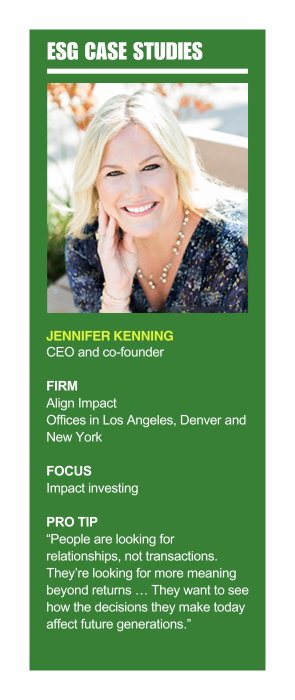

Impact investing began as a personal journey for Jennifer Kenning, one that led her to co-found Align Impact and help wealthy clients use their assets to make a difference without sacrificing market-rate returns.
It was 2008, when she was director of wealth management at Aspiriant, that she began to feel a pull that led her career in a new, more purposeful direction.

“I was struggling with severe depression and was looking for meaning and purpose in my life,” said Kenning, who in 2014 went on to build the firm she now leads.
She had volunteered with nonprofits in Nicaragua and East Africa, but it was working to help the homeless population in Los Angeles’ Skid Row that showed her that “the systems were broken” for financing social programs and other initiatives in the U.S. That led her to explore the relationships between wealth and poverty, which drew her toward impact investing.
“I didn’t really intend to weave this into my prior practice. I just started sharing with clients about how I was ‘coming alive,’ and they said, ‘I want that,’” Kenning said.
“There’s just a natural conversation in wealth management today," she added. "People are looking for relationships — not transactions. They’re looking for more meaning beyond returns.”
Her firm’s model is not competing to steal clients from their existing advisors. Although Align Impact is the lead advisor for clients in some cases, it most often is the “quarterback” designing impact strategies or managing sleeves of a portfolio, said Kenning, who has received two awards from InvestmentNews and is on the publication's advisory committee.
“We can wear whatever hat you want us to, from philanthropic to market-rate returns or impact-first,” she said. The firm builds impact portfolios designed to get market-rate returns for 95% of clients, with the other 5% prioritizing impact over returns, she said.
Align Impact has at least $2.6 billion in assets under advisement and offices in Los Angeles, New York and Denver. The firm works with more than 60 individuals, families and institutions. Clients generally have $25 million or more in assets to invest, but the company can build portfolios with at least $2 million, Kenning said.
One client is Suzanne Lerner, co-founder and president of apparel company Michael Stars, who met Kenning about seven years ago at a philanthropy event. Lerner wanted to have the investments within her portfolio at Morgan Stanley matched up with her values.
“I’m interested in so many things, but we focused on it,” said Lerner, who now meets quarterly with Kenning and has a sleeve of her portfolio advised by Align Impact that's focused on affordable housing and other causes.
“She made my broker more aware of what I wanted to be invested in,” Lerner said. “The returns are great — it’s what’s to be expected. I don’t expect the same return that I might get through another kind of investment. I care more about [the impact] than the profits.”
Lerner is interested in alternative energy, although her portfolio still includes an oil company — she votes occasionally in proxies, she said. She also focuses on holding women-owned companies and securities focused on addressing climate change.
She describes Kenning as “compassionate and empathetic.”
“Jenn is able to look at all sides of an issues,” Lerner said. “She understands the world. She understands profitability.”
Clients are most often interested in climate issues, followed by social and racial justice and promoting economic opportunities that support basic human rights, Kenning said. Aside from impact investing strategies for clients, her firm has its own focus on diversity.
“I do really believe that we are changing the face of finance,” she said. “I want to bring back the relationship side of wealth management.”

Relationships are key to our business but advisors are often slow to engage in specific activities designed to foster them.

Whichever path you go down, act now while you're still in control.

Pro-bitcoin professionals, however, say the cryptocurrency has ushered in change.

“LPL has evolved significantly over the last decade and still wants to scale up,” says one industry executive.

Survey findings from the Nationwide Retirement Institute offers pearls of planning wisdom from 60- to 65-year-olds, as well as insights into concerns.
Streamline your outreach with Aidentified's AI-driven solutions
This season’s market volatility: Positioning for rate relief, income growth and the AI rebound
